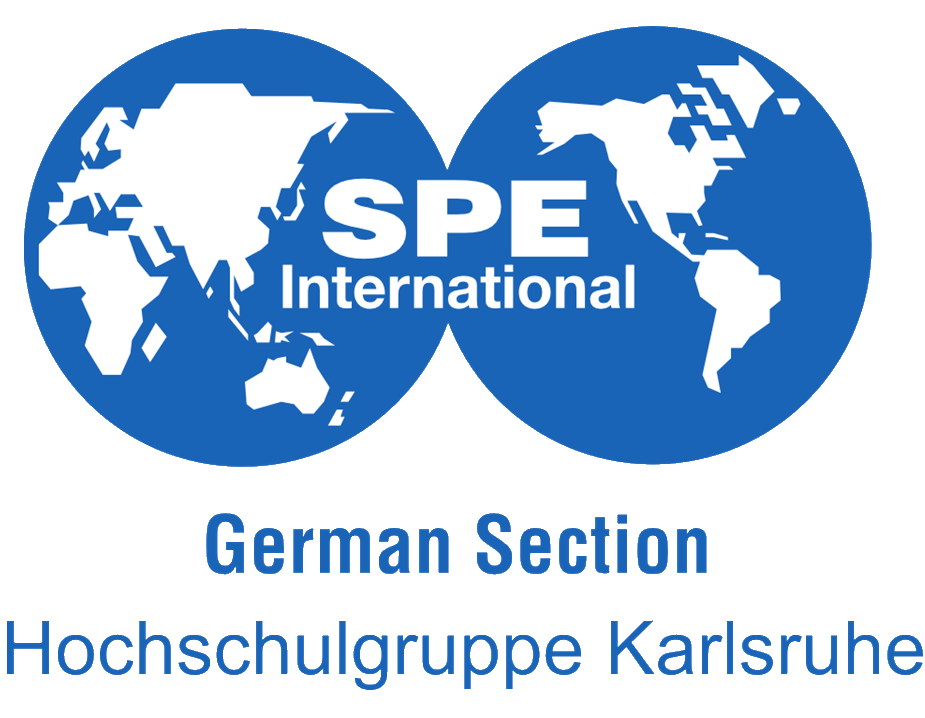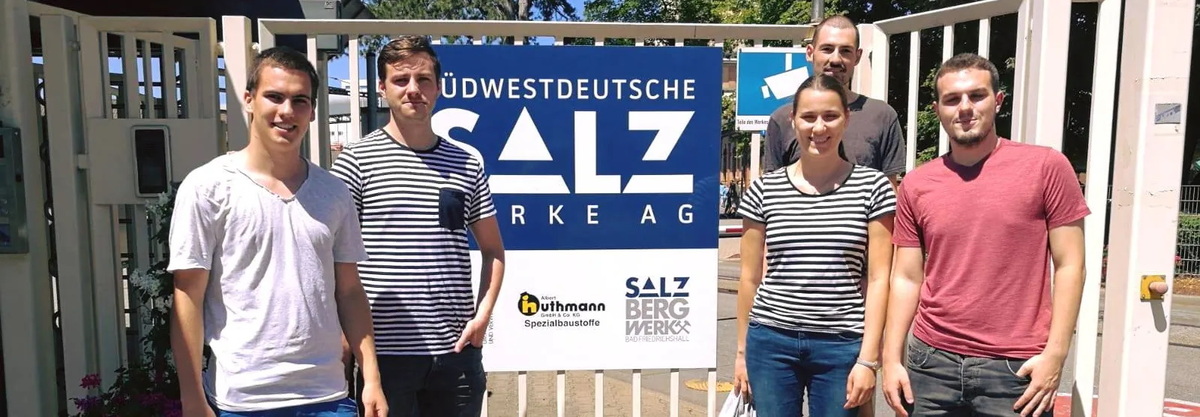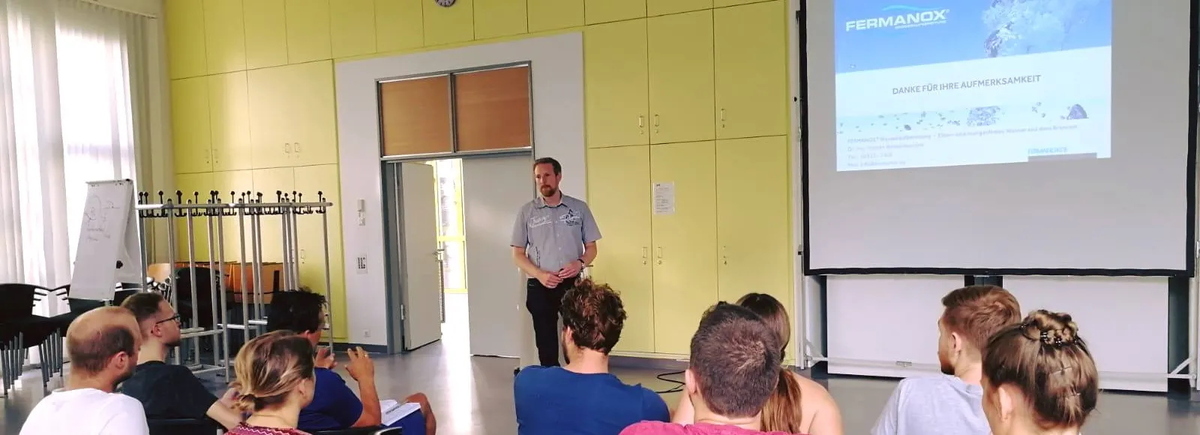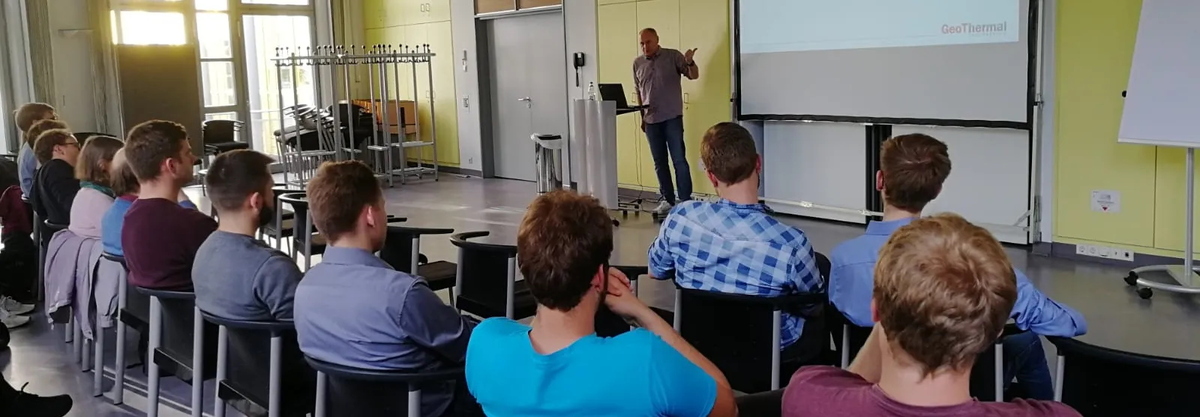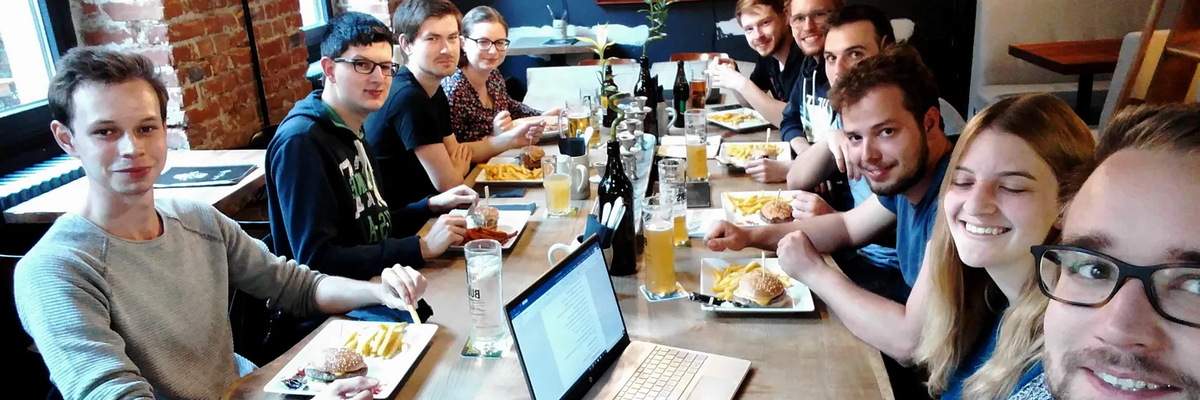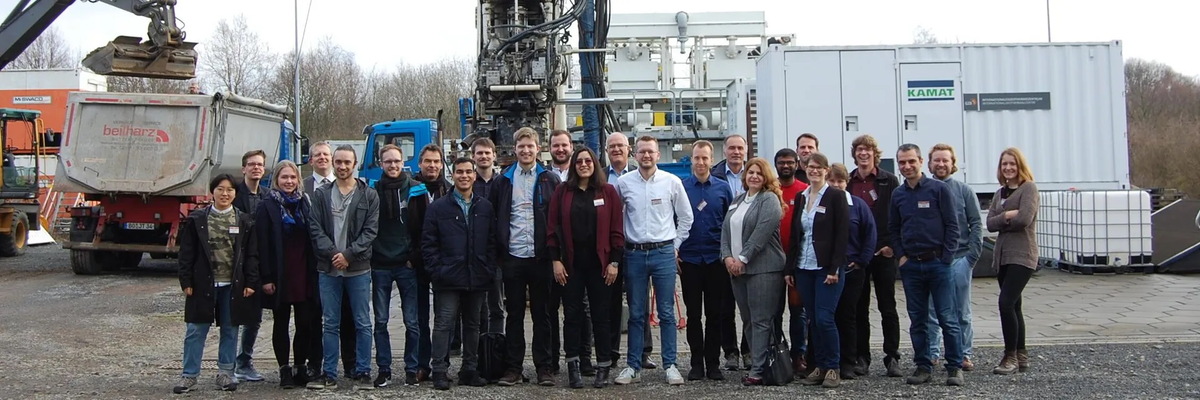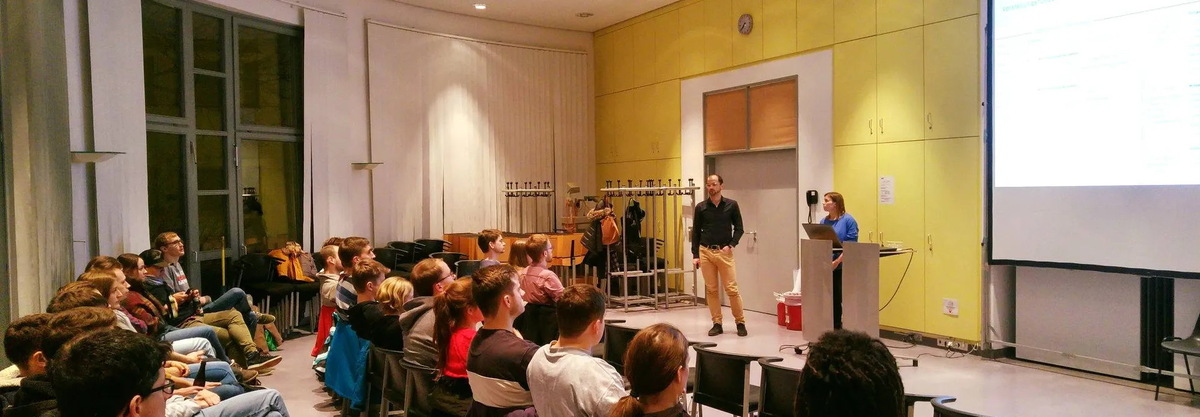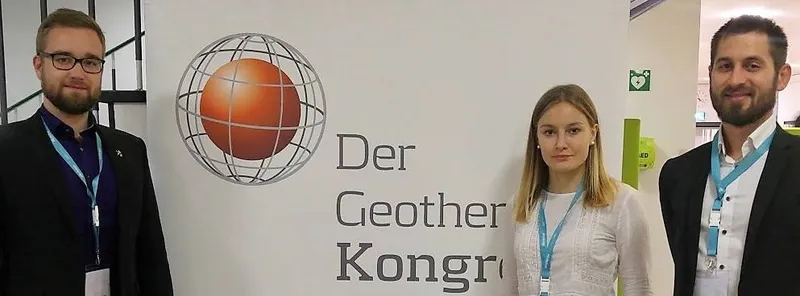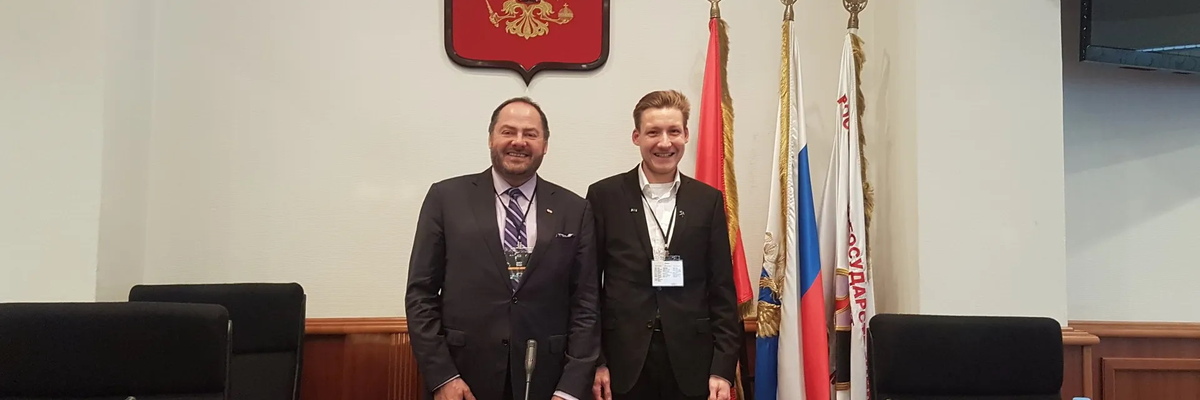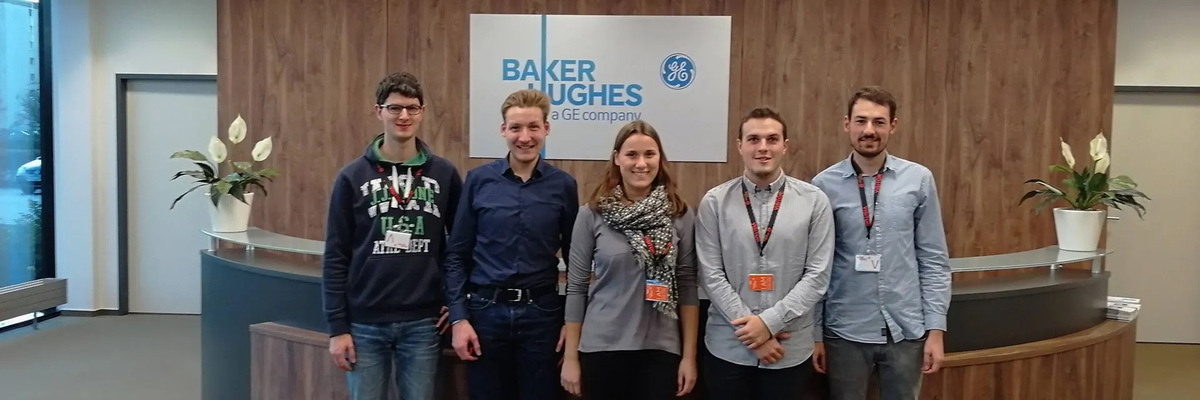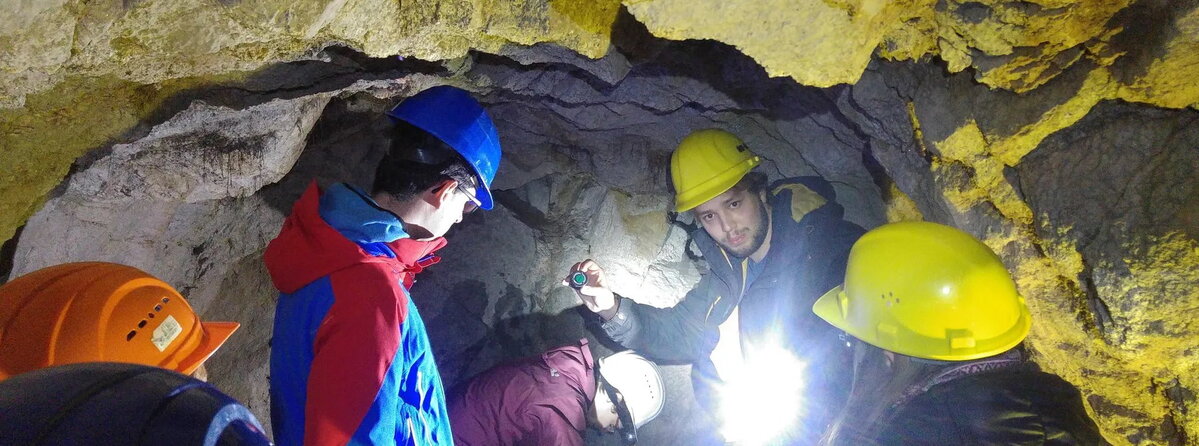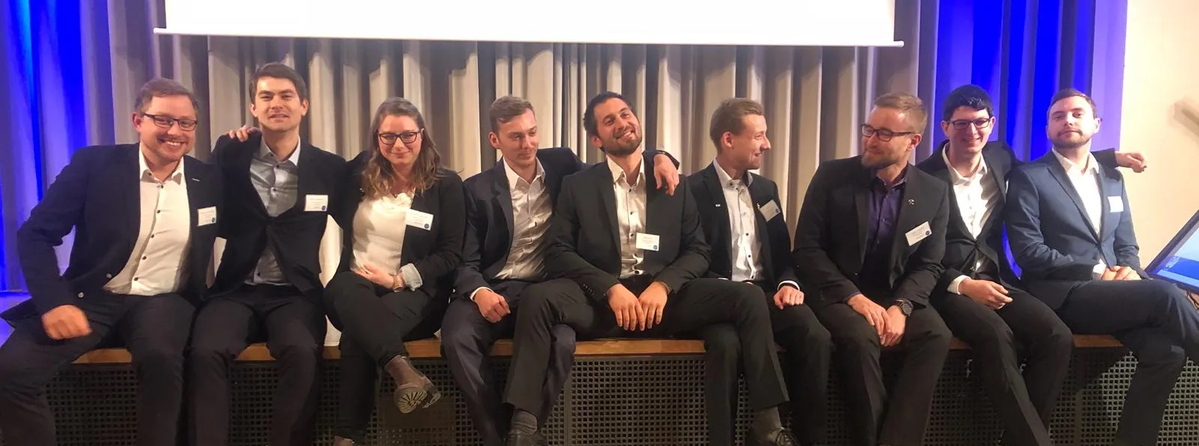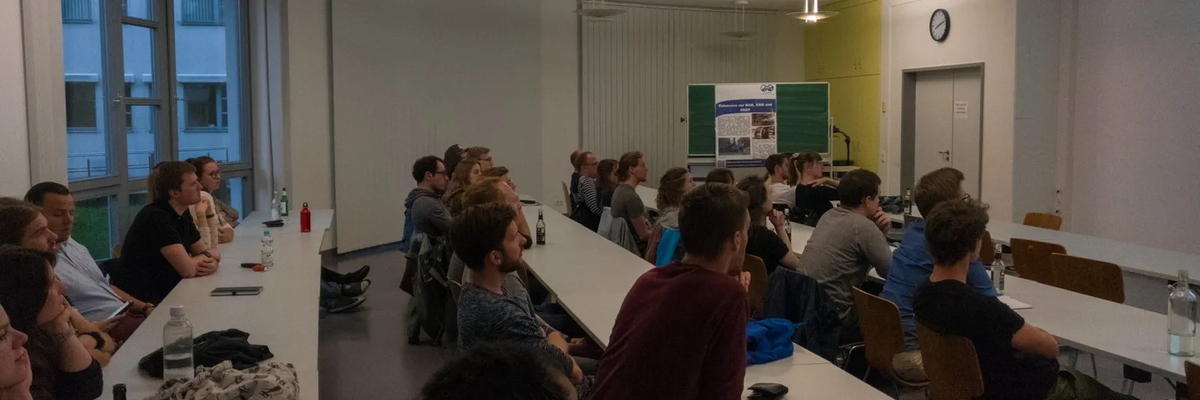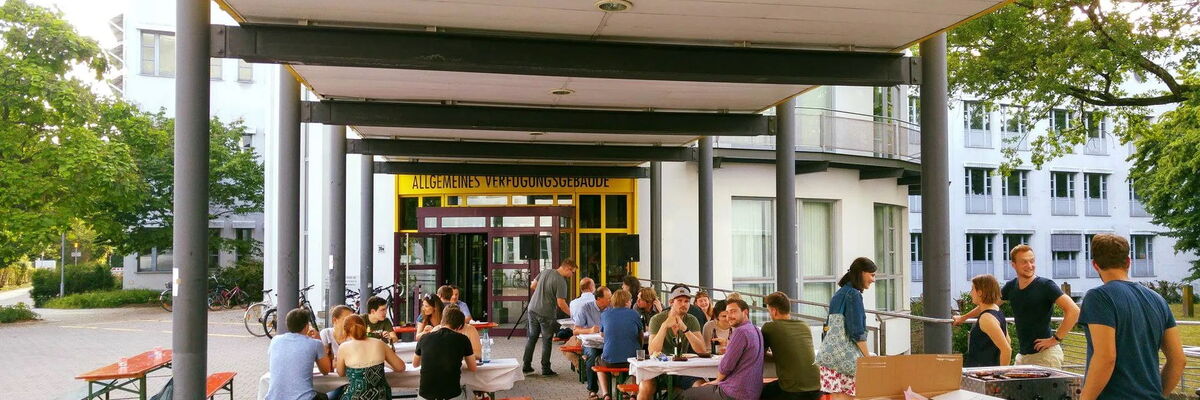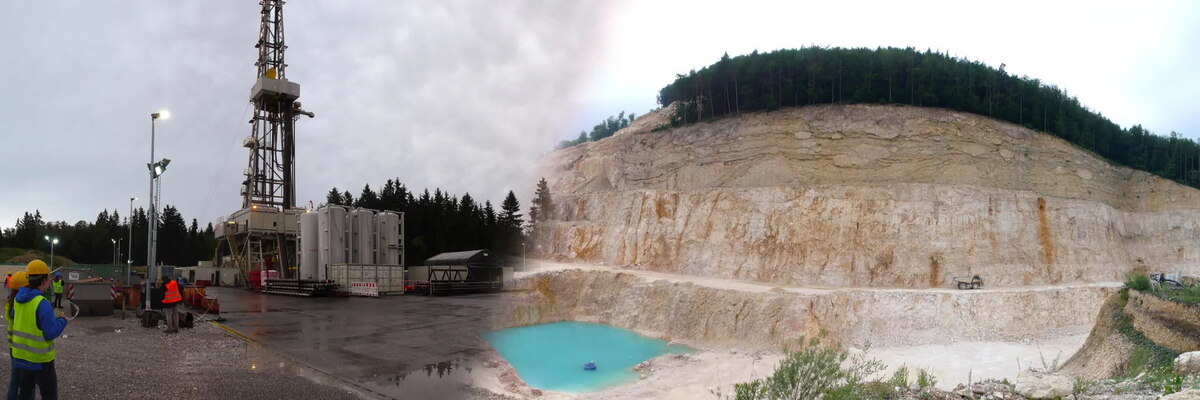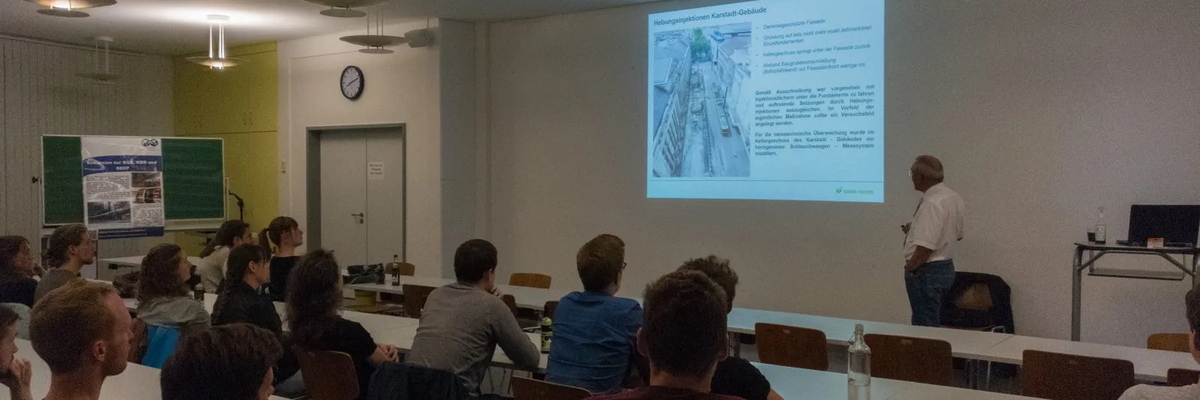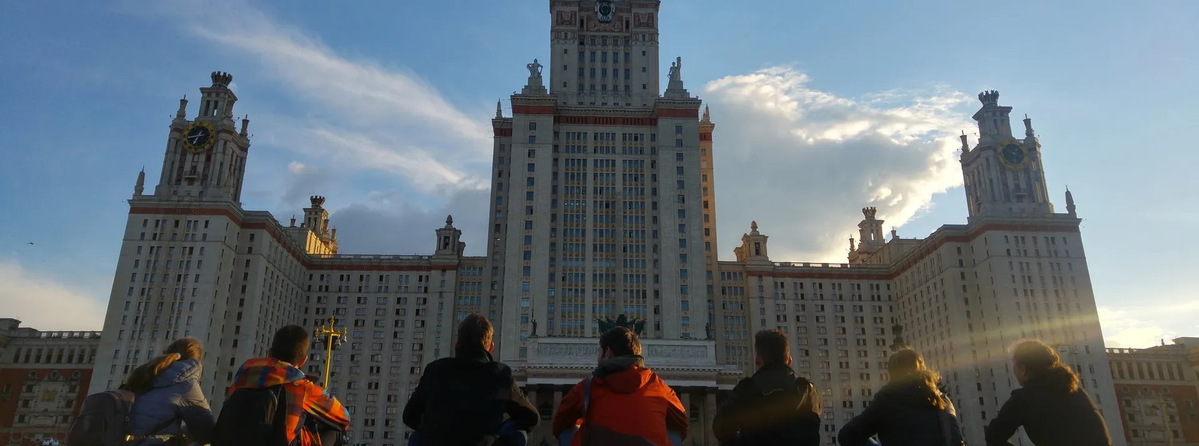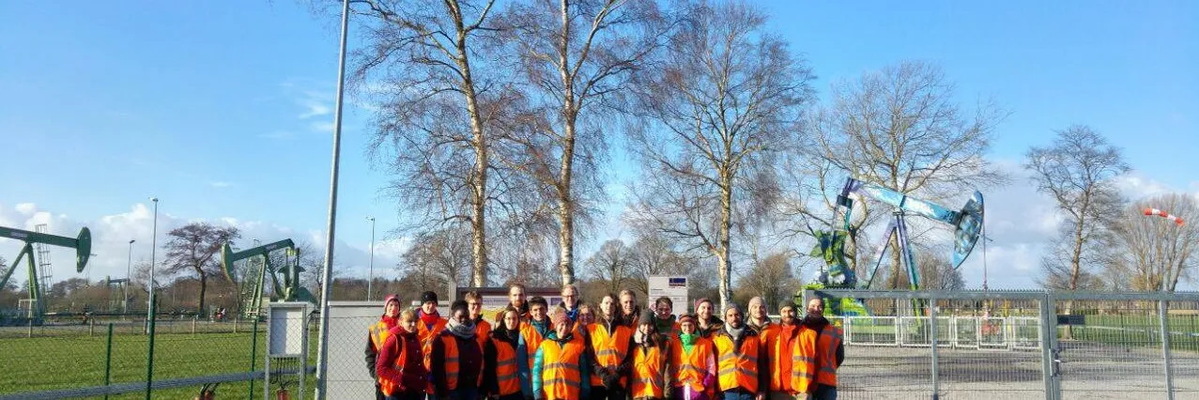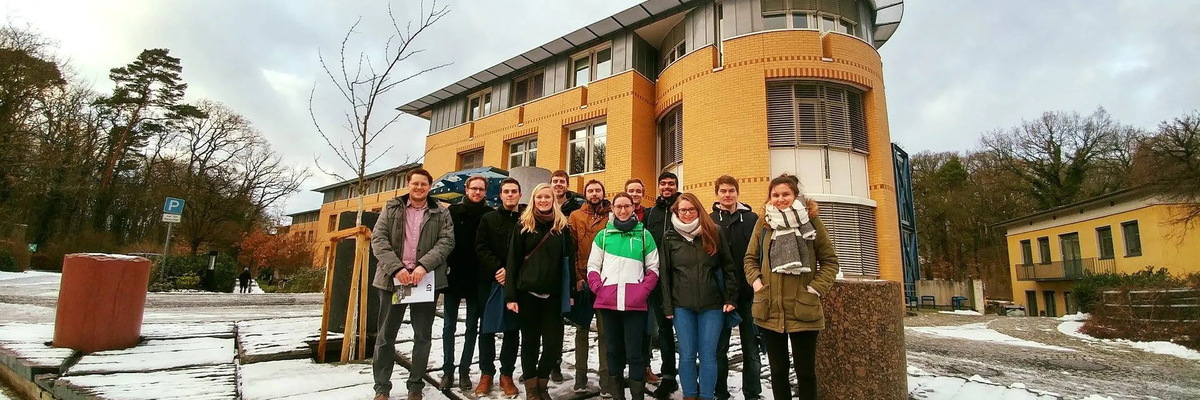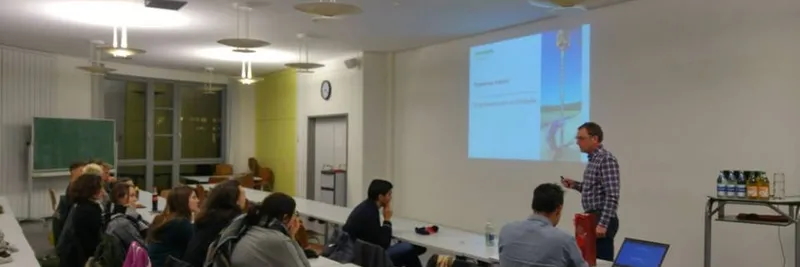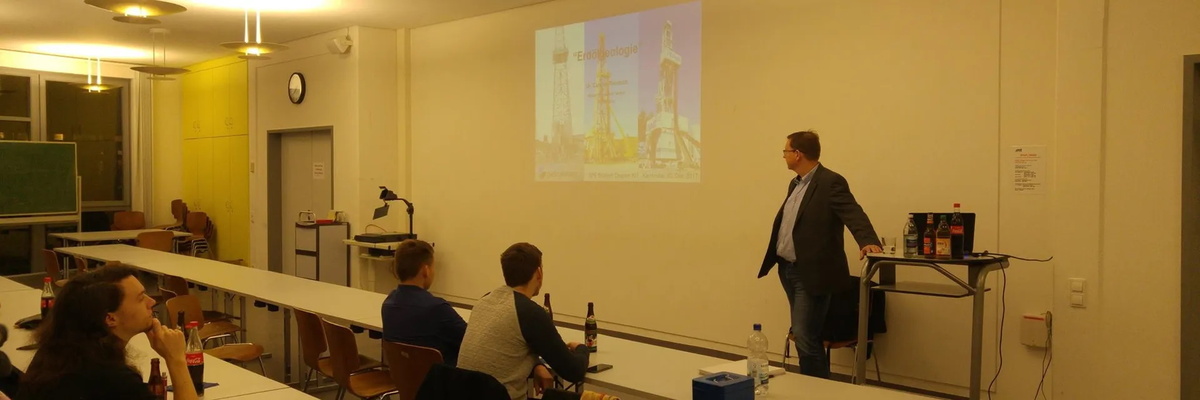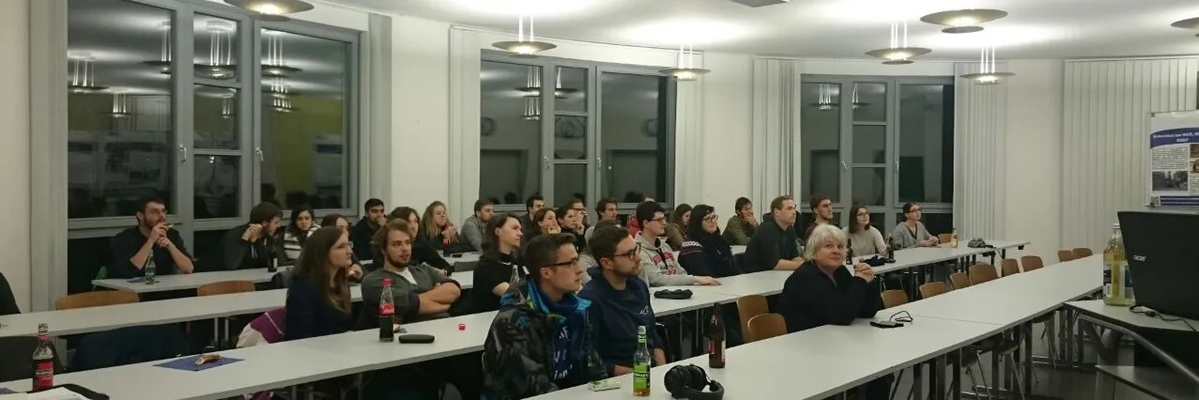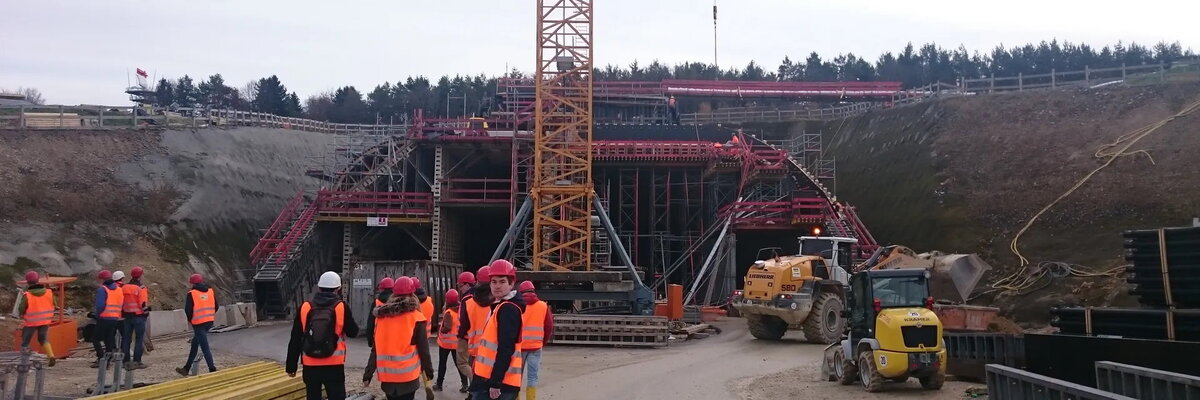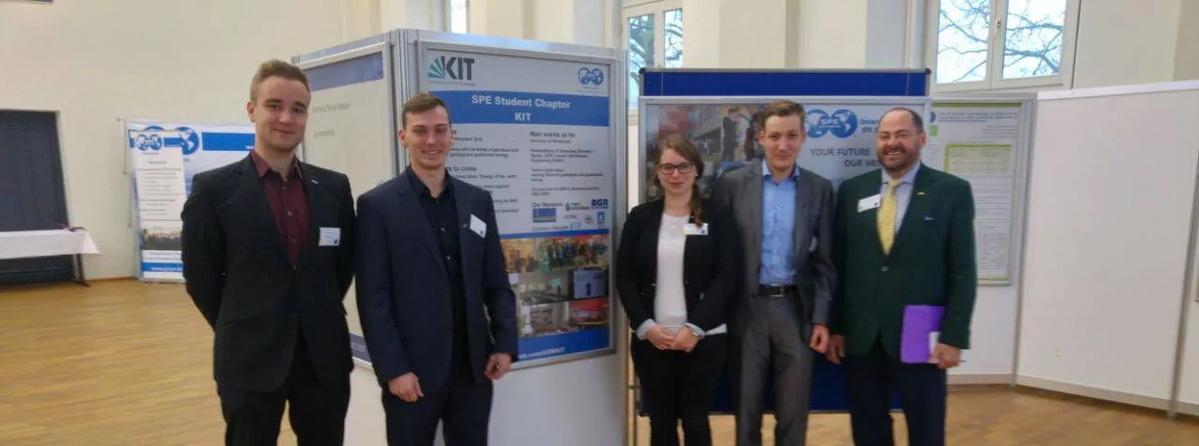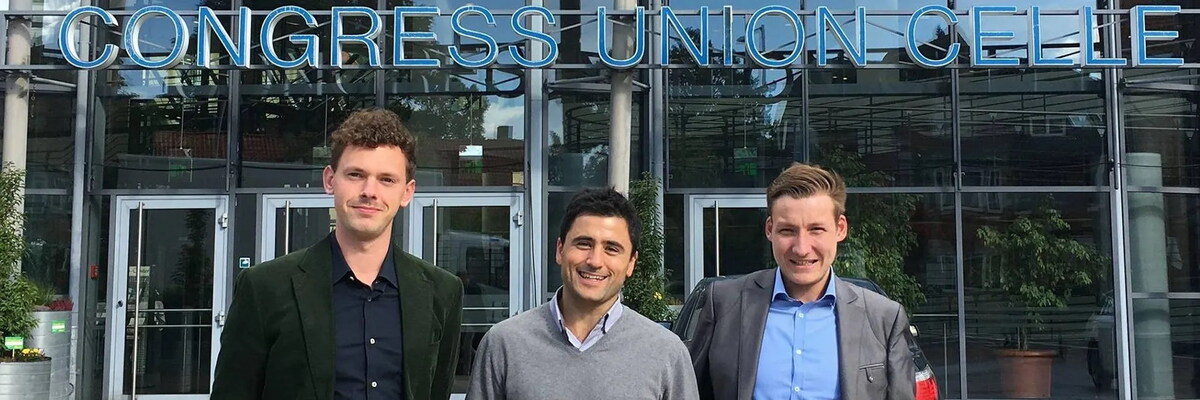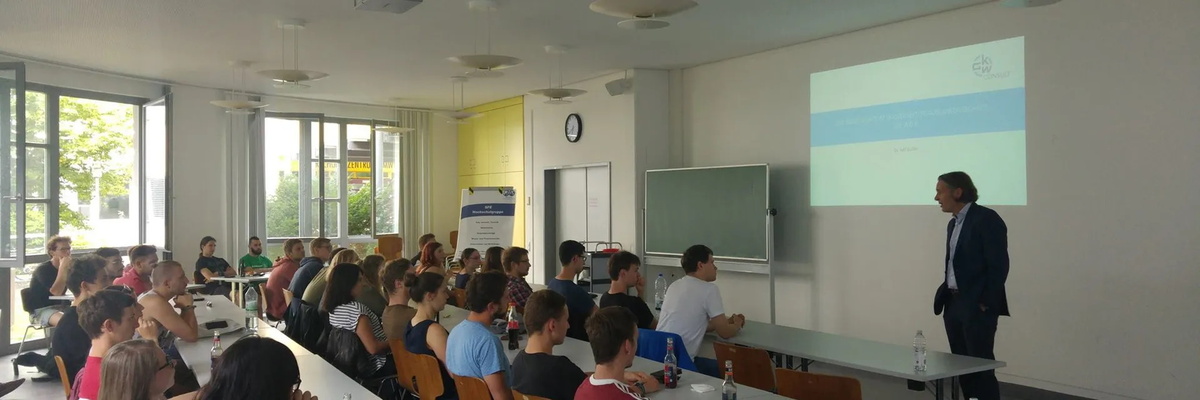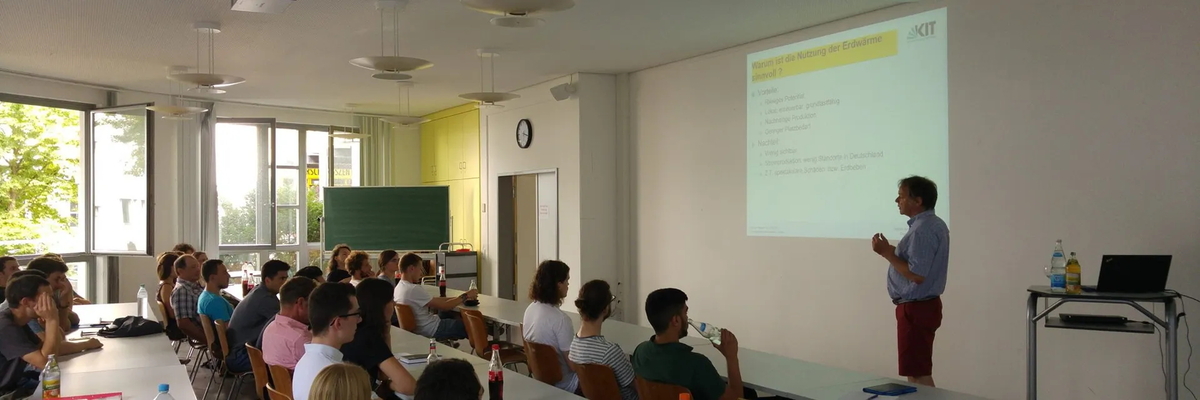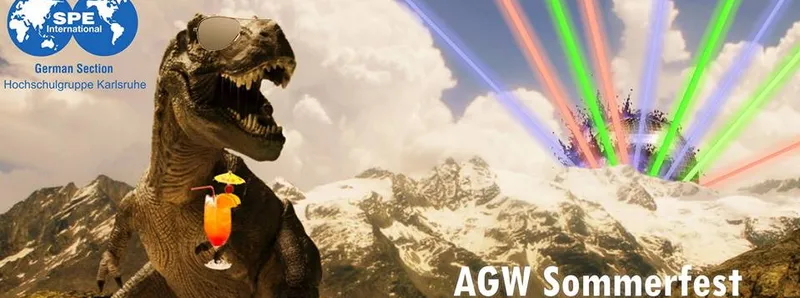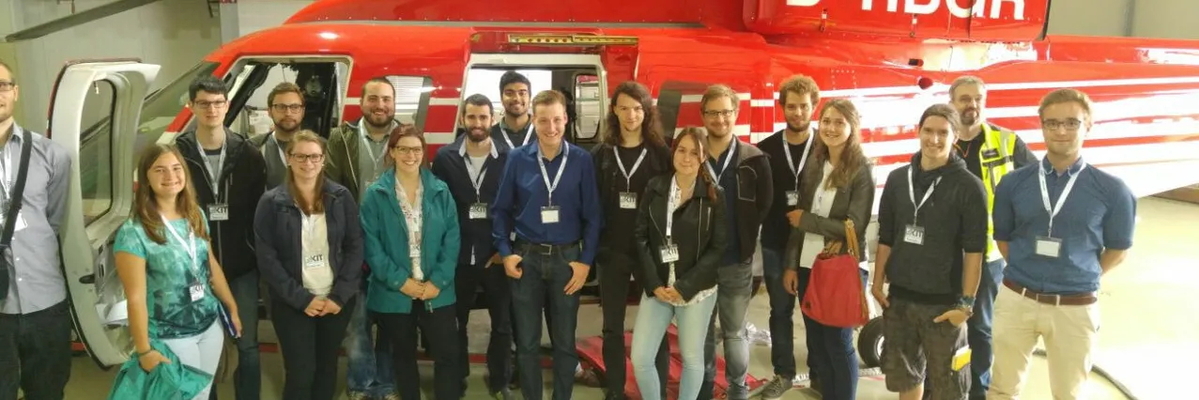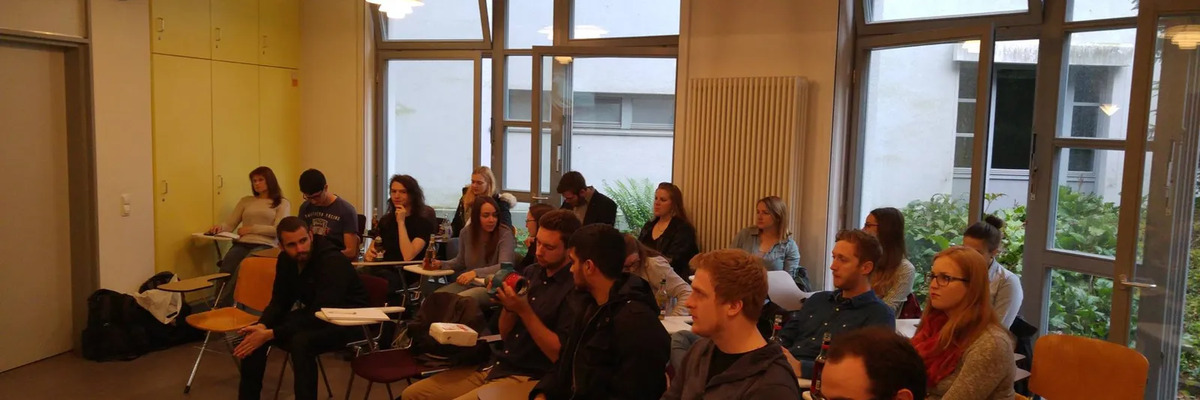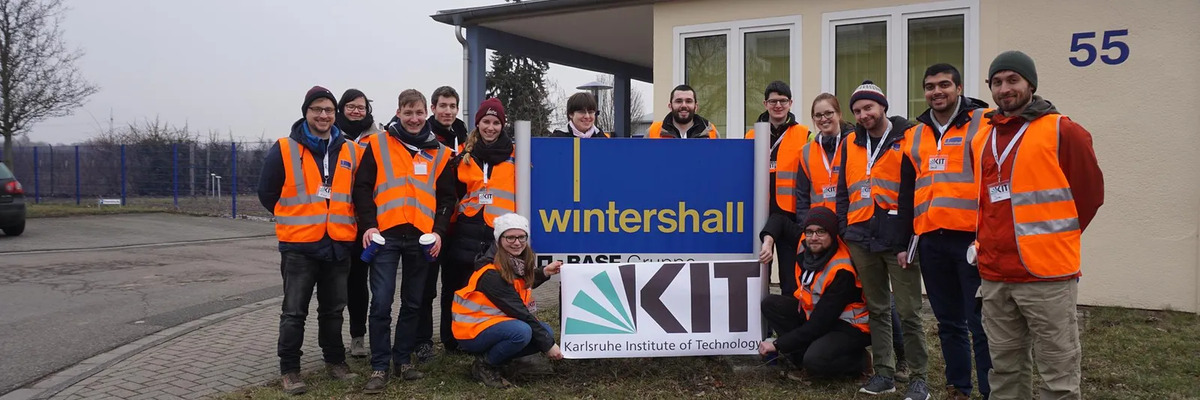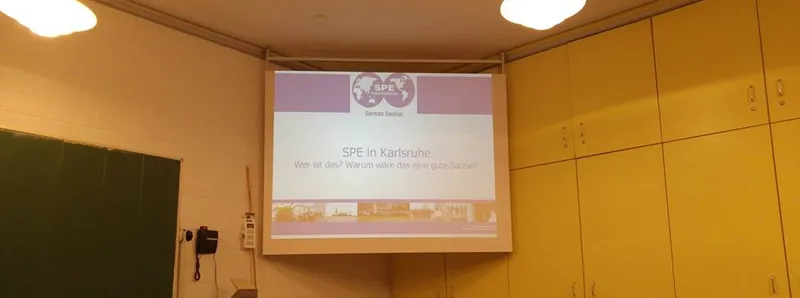Upcoming events
| Event | Wann und wo? |
|---|---|
| WebSPE Nat Stevens (Exxon Mobile), topic: Introduction to reservoir modeling in the oil industry and example from Kashagan Field, Kazakhstan. | 08.12.2020, 04:00 pm, Zoom, click here to join. Joining will be possible from 3:45 pm onwards. |
28.06.2019 Field Trip Südwestdeutsche Salzwerke AG
On the 28th of June we had our first excursion this year to one of the most important salt producers in Europe, the Südwestdeutsche Salzwerke AG.
First we visited the headquarter of the Südwestdeutsche Salzwerke in Heilbronn, where we got an interesting presentation by Jan Schibilla, the leading foreman of miners in the production department of drilling and blasting. He gave us an introduction to the history of the 136 year old company, the recent production methods through blasting or cutting and the application fields of halite. Furthermore he told us about the geology and the mining of the two halite deposits in Heilbronn and Bad Friedrichshall. In addition we got a guided tour through the production area in Heilbronn. We thank Jan Schibilla for the interesting insight into the company.
The second part of the day we attended the visitor mine of the Südwestdeutsche Salzwerke AG in Bad Friedrichshall, which is around 10 km away from Heilbronn. Because of the huge caves which were mined in the halite deposit, it is possible to enter the visitor mine without a guide. There we learned much about the historical and recent mining methods in the deposit. Of particular interest was a 150 m long drill core drilled near the mine showing the stratigraphic structure and fossils of the halite deposit contained therein. Further highlights were two huge salt caverns which were cut into the salt by the "Continous Miner" and the miner's slide at the end of the tour.
Altogether it was a very informative and worthwhile excursion, which is why we would like to thank the Südwestdeutsche Salzwerke again.
25.06.2019 Lecture: Winkelnkemper GmbH - water treatment system Fermanox
On Tuesday the 25th of June, we invited Dr. Ing. Torsten Winkelnkemper, CEO of Winkelnkemper GmbH from Wadersloh in Nordrhein-Westfalen, who gave us an interesting lecture about their Fermanox system. The fermanox system is a water treatment system, which enables the removal of iron, manganese and ammonium in aquifers with anoxic conditions below the surface.
In the first part of his lecture he told us about the functionality of the Fermanox system. The system is able to build up a zone with oxidizing conditions through injections of oxygen-rich freshwater around a well or drillhole. To keep this zone stable its necessary to inject 1 liter water for 5 liter removed water from the aquifer. Therefore at least two boreholes are necessary for a permanent operation of the system. With several boreholes, the system can be used for both water treatment and geothermal application.
In the further course oft his presentation, Mr. Winkelnkemper gave insights into current projects and also pointed out problems in the practical application of the Fermanox system such as bad preconditions of the aquifers or bad handling of the operator. After his presentation he answered all our questions, so that no question remained unanswered.
We would like to thank Mr. Winkelnkemper for a very interesting and informative lecture and are already looking forward to the next events.
28.05.2019 Lecture: GeoT The heat is on - Geothermie in der Praxis
Tuesday the 28.05. we invited Dr.-Ing. Horst Kreuter, CEO of GeoT in Karlsruhe, to give a lecture on the geothermal industry titled „the heat is on – Geothermie in der Praxis“. Mr. Kreuter gave an introduction to the geothermal market in Germany and across the world and his predicitions for the future development in both the power and heat supply sector. He also introduced us to the political and economical problems they are facing, both as a company and as an industry.
On a more practical note he explained the possible lithium extracion from geothermal fluids in the Upper Rhine Graben and its possible effect on the geothermal industry. He also told us about the all new Eavor-Loop System, a deep geothermal closed loop system.
In the end it never had the chance to get boring, because he spiced things up with a lot of personal stories and insights, letting us profit of his long time career in geothermics.
Afterwards we even had the opportunity to chat in a cozy environment with burgers and beer. Thank you for joining us again Mr. Kreuter and for all the great new information you gave us. Its save to say that everyone has had all questions answered!
14.05.2019 SPE goes Oxford!
In order to plan the upcoming semester we had our todays meeting at the Oxford in Karlsruhe. With beer and burgers, we had the perfect setting to plan our upcoming events as lectures by GeoT or a field trip to the Süddeutsche Salzwerke AG. Stay tuned!
In two weeks, our next meeting will be right before the lecture of Dr.-Ing. Horst Kreuter! Afterwards he will join us for a drink back at the Oxford again. The perfect chance for you to get insights of the industry in a cozy atmosphere. Don’t miss it!
22.02.2019 SPE get together, Bochum
On 22nd of February one of our members was able to join the SPE get together event at the international geothermal center in Bochum.
The event featured detailed looks into the work of the GSSPE and SPE in general, informing about upcoming events and possibilities within the SPE network.
Also included were loads of insights into the work of the GZB and a detailed look into their current research, with the most impressive probably being their research in laser assisted drilling.
The evening offerened loads of occassion to get to know the students and officials of the GZB and also meet a large group of the Aachen Chapter.
Thank you to the GSSPE for sponsering the (quite long) journey and thank you to everyone at the GZB for the awesome event!
17.01.2019 Lecture EnBW Geothermal Energy
We were grateful to welcome Dorothee Siefert and Dr. Sören Welter of the research and development department in the field of geothermal energy of the EnBW Energie Baden-Württemberg AG at our institute. The EnBW is the third biggest energy company in Germany with its headquarters located here in Karlsruhe.
For expanding the share of renewable energies, the EnBW also engages in research of geothermal energy production. Besides the in-house department, the company also supports the institute of Geothermics at the KIT.
We could enjoy an interesting talk about the recent projects the department is dealing with. Besides conventional problems like the economic feasibility of power plants, several interesting topics were presented:
The DESTRESS project, co-founded by the EU, deals with soft stimulation treatments of geothermal reservoirs. For a sustainable and environmentally friendly energy production, an other research topic is the treatment of CO2 degassing in the thermal waters' cycle. A further field is the extraction of Lithium from geothermal brines for improving the profitability of geothermal power plants. In this regard our member Kristina presented the results of her Master Thesis which she made in collaboration with the EnBW.
We thank our lecturers for this interesting talk and are excited for our upcoming events!
30.11.2018 The German Geothermal Congress
What a month for our student group! 4 weeks - 4 Excursions - 4 Cities.
Students of our group have been on the road again. After Freiberg, Celle and Moscow our final destination on November was 'The German Geothermal Congress' #DGK in Essen.
We took the opportunity to learn a lot about the energy market in Germany and the future of geothermal energy production. Different companies and scientists showed the state of the art of Reservoir Geology, Drilling and Logging regarding geothermics. Besides that we could enlarge our network at the Ice-Breaker party, the formal Diner or the poster sessions. And last but not least we of course met old friends of the #GSSPE!
It really was a great event, closing a great month for our student group!
25.11.2018 Oil and Gas Horizons Moscow
Last week our university group participated in the Oil and Gas Horizons X Conference in Moscow. It was great to return to this wonderful city, to meet old friends and to find new friends, too!
Our participant Kai Stricker did not only participate but was also awarded with the 2nd place of the Geoscience session of the Technical Program and was additionally part of the team which won the 3rd place of the economical Oil Rush game!
We want to thank the organizers of this great conference Gubkin University SPE Student Chapter for this amazing week, we will return to Russia and especially to Moscow for sure! And of course you are invited to participate in our German conference (STC 2019 in Aachen), too!
We are looking forward to meeting you again soon! Спасибо!
#ogh2018 #ogh10 #russia #moscow #spe #somuchfun #spefamily #networking
20.11.2018 Baker Hughes Student Day
Five members of the SPE student group took the opportunity to attend the student day of #BakerHughes in Celle. After a presentation about the BHGE company (the only full stream company btw), we had the opportunity to see how the tools for drilling and logging are made. From scratch over prototyping to big CNC machining, we could see all product steps to build the final tool. Before the tools leave the company, they must pass a heat and drop tests to guarantee functionality under harsh environmental conditions.
In the afternoon we had a talk about challenges and solutions in projects to get a better insight into the real exploration world. Afterwards there was enough time to ask all our questions to the numerous professionals in the room or to get the contact info to apply for the ASPIRE Leadership Program.
We thank the team of Baker Hughes for this opportunity to learn more about their interesting company!
14.11.2018 Schwarzbach-Talsperre Forbach
Today we had the pleasure to visit the Schwarzenbach-Talsperre of the #EnBW. At first we got some insights of the challenges of the today's energy market. Afterwards we could visit a drilling site, where currently core samples are taken for a planed cavern storage facility. And finally, of course, we could visit the nearly 100 years old dam wall and even took a look insight!
09.11.2018 Student Technical Conference Freiberg
Three days at STC 2018 are over and it is time to wrap up our great experiences and impressions of the last days.
On Wednesday we visited the impressive research mine of the TU Bergakademie Freiberg "Reiche Zeche". After very interesting and fruitful discussions with other student chapters at the round table, the day was rounded off by a group dinner and the icebreaker party.
On the next day, the actual conference program began. We listened to many great talks of fellow students, got very benificial impressions of John Macpherson from Baker Hughes, a GE company about possible career paths in the E&P industry as well as from four young professionals who reported of their career and especially the transition from university to the working life. Of course, our university group participated actively and presented five posters at the poster session! The day ended with more socialising and some cold drinks :)
Unfortunately today was already the last day of this year's STC. We became active once again as Valentin Goldberg presented his current research project about CO2 solubility in geothermal brines. Afterwards Jean-Marc Dumas, the SPE regional director, gave us an outlook of the future development of the E&P industry, especially in the context of the ongoing energy transition) and shared roadmap of the SPE regarding this challenging future! The conference was wrapped-up by the honor of all contributors and organizators of this wonderful conference!
It was simply great to be in Freiberg (thanks to our host, the SPE Student Chapter Freiberg), we met many old and new friends and had a great time. It was definitely a blast :)
We are sure to participate at next year's STC again, which will be held at Aachen! Save the date: 7/8th November 2019!
02.07.2018 Lecture Geology - a real science?
We were pleased to welcome Dr. Hans-Gert Linzer from the RAG (crude oil exploration company) from Austria with the exciting topic "Geology - a real science?". Dr. Hans-Gert Linzer studied geology in Karlsruhe and wrote his Phd thesis there. Since 1998 he has been working in Vienna at RAG in hydrocarbon exploration and the development of hydrocarbon fields. In addition, he has recently been engaged in the exploration of geothermal reservoirs. He gave us a lecture on the topic of oil exploration in the Alps, how to use pictures of the surface and underground and to what extent the genesis of the Alps has to be included.
30.06.2018 Institute Summer Party
19.06.2018 Lecture: Job profile of a geologists
PD Dr. rer. nat. Torsten Steiger is self-employed at his own company STEIGER GEOmedia, dealing with educational programs in geosciences and sedimentary expertises and in addition consultant at the GEOTEC CONSULT engineering company where he deals mainly with deep drilling projects for geothermal energy production.
15.05.2018 Lecture Kombilösung Karlsruhe
On 15.05.2018 we had a very interesting lecture by Dipl.-Geol. Stephan Knopf and Managing Director of KREBS and KIEFER about the project Kombilösung Karlsruhe. Mr. Knopf reported on the project and its planning in general, as well as on the engineering geological aspects and the technical and geological challenges of this project. He gave us an insight into the underground of Karlsruhe and reported on what the future of Karlsruhe will look like.
We would like to thank Mr. Knopf for the instructive presentation!
20.04. - 29.04.2018 Field Trip Russia
Our Student Group had the pleasure to organize a field trip to Russia, together with the SPE Student Chapter from Aachen.
We started our journey in St. Petersburg. After first days of sight seeing together with friends of the SPE Chapter of the Gubkin State University of Oil and Gas, we had our first 'business stop' at a research center of Gazprom Neft.
The same day we continued our journey to Moscow. Here we had again the possibility to get to know another beautiful city. Besides all the historical places we had the possibility to enlarge our network by visiting the companies Schlumberger and Salym Petroleum!
It was a great honor and pleasure to have this great stay and hospitality from our new friends from Moscow!
17.02.2018 Field Trip Detonation Seismic Emlichheim
We want to thank Wintershall for the great excursion we had yesterday. The long drive was worth it. We were able to see what it means to plan a seismic, to communicate to the public and finally to carry it out.
In the best weather conditions, we were able to witness the loading and blasting of the seismic and also got an idea of the result - a high-resolution 3D model of the reservoir at 800m depth.
On the picture you can see the students of the SPE group of colleges in front of the first pump which was set in the Emlichheim oil field and which still promotes today.
21.01.2018 Field Trip: Berlin
Our first stop was the Geo Research Center Potsdam on the Telegrafenberg. Five different scientific institutes are located there with a total of 2300 scientists.
In the last 100 years numerous scientists such as Bunsen, Kirchhoff and Einstein have made numerous scientific breakthroughs here. To every geologist the Geoid in which the distribution of gravity is presented, should be a concept that has been developed here.
Our next stop was the branch office of the "Bundesanstalt für Geowissenschaften und Rohstoffe" in Berlin Spandau.
The BGR is home to Europe's largest rock and mineral collection. Emerging from the former royal minerals cabinet of Prussia, this collection was expanded again and again. Among other things, through the collection of the GDR, which has done much exploration. The collection still has great scientific relevance today, which is why the 180,000 data sets are being digitized and will be made available online from this year.
How commodity markets develop and how they are observed, we could learn at the German raw material agency DERA. The goal of DERA is to secure the long-term supply of raw materials and energy in Germany. The DERA is the political reaction to the sometimes sharp fluctuations in raw material prices and issues a report on critical raw materials every four years.
We thank all participants of the GFZ, the BGR and the DERA, who made this exciting and informative excursion possible!
12.12.2017 Lecture: Heat Storage in the Upper Rhine Graben
At our lecture yesterday, we got exciting insights into the field of heat storage in the underground, which is still relatively little used in Germany. First of all, Prof. Blum from KIT spoke about the project GeoSpeicherBW, in which KIT is in charge. In the project, various demo systems are to be developed, which should serve as an example of the new technology. It is especially interesting for students as there are many opportunities to get involved in project studies, master's theses or PhD theses.
After a lecture from the research, we got a direct insight into the practice of Edelbert Krämer, Managing Director Krämer Erdwärme und Brunnenbau GmbH. Mr. Krämer showed us the technologies that he developed in his company in order to open up the field of heat and cold utilization from the underground. He also clarified very clearly that the job profile requires a lot of creativity in order to defy the various conditions and to comply with all requirements of the authorities.
We thank Mr. Blum and Mr. Krämer for the exciting presentations and the visitors from last night for their great interest!
06.12.2017 Lecture: Petroleum Geology in the Upper Rhine Graben
We would like to thank Dr. Carsten Reinhold for a very exciting and interesting lecture on the topic of petroleum geology in the Upper Rhine Graben.
In the first part of the presentation Dr. Reinhold talked about the history of oil exploration and how closely it is linked to the Upper Rhine Graben on our doorstep. The first production of oil products in Europe, as well as the first oil well in the world, as well as the first geophysical logging of the Schlumberger brothers took place here in the Upper Rhine Graben.
In the second part of the talk, Mr. Reinhold discussed the latest findings in exploration and the methodology for developing new reservoirs. This showed above all that the possibility of 3D seismic offers great potential to re-evaluate known reservoirs. Here, Dr. Reinhold also concrete insights into the work of a petroleum geologist and also showed how we can use the knowledge that we have acquired at university later in our future jobs.
In the end Dr. Reinhold gave us a few more tips and qualities which an oil geologist must bring, because it is just no occupation like every other. He characterised the occupation with the following four words: internationally - mobile - adaptable - consciously. As a geologist it is always important to be mobile and adaptable, because the work will lead you sooner or later abroad. In order to always be able to act even when dealing with difficult issues, it is also important to be able to adapt quickly to new situations and to be open to different, new cultures and traditions of the countries visited.
We are very grateful to Dr. Carsten Reinhold for his very interesting and instructive presentation and his useful advices he gave to the audience!
28.11.2017 Lecture: Nuclear Waste Storage
On the 28th of november, Mrs. Dehmer gave an exciting talk about the Federal Association for disposal and site selection. Here are the fundamental considerations the reversibility, transparency and participation rights and social accompaniment. The final disposal is carried out in a mine in a formation of rock salt, clay or crystalline rock.
The site selection working group of the BGE deals specifically with the condition of the subsoil with regard to a repository site. There are also the exclusion criteria take into consideration, such as rise rates, fault zones or volcanism.
At the end of the presentation was also reported on the further action of the Federal Association for disposal. Especially interesting for all geoscientists: The BGE is looking for more than 20 geologists next year, probably!
After an interesting and exciting discussion round, a variety of topics were discussed, with beer and pretzels.
We would like to thank Mrs. Dagmar Dehmer of the German Federal Association for Disposal for her exciting talk about the future of disposal in Germany and looking forward to see you all again at the next lecture!
23.11.2017 Field trip: ARGE Tunnel Albabstieg
On 23th of November 2017, seventeen of our members joined the consortium ARGE Tunnel Albabstieg near Ulm. The company is involved in the construction of the Alb descent tunnel. The Alb descent tunnel is a 6 km long railway tunnel of the new stretch of road "Wandlungen-Ulm" of Deutsche Bahn AG. At the beginning, Maximilian Wunderle, the geological department head of the Max Bögl company, gave an initial insight into the construction work on the Alb descent tunnel.
Then, the project was presented. Construction started in January 2014 and the release is scheduled for December 2021. The tunnel is designed in two separate, single-track tubes with a section of basket arch and has a 2.5% inclination towards Ulm. The excavation work was carried out using a combined excavator / blasting process, which resulted in a tunnel excavation of 1.5-7.5m per day. Currently, the excavation work is completed in both directions and it will be built about 1 km long free track above ground.The planned speed in the track from Stuttgart to Ulm should be between 100 and 250 km/h.
Geologically, the tunnel lies in the karstified white Jurassic, which consists of lime, and tertiary formations. Although the tunnel is located above the karst groundwater level, there are karstic gaps, making a karst exploration program with exploratory drilling inevitable.
Another problem is the acceptance of the population, because the tunnel runs in places only about 14 m below the building foundation. Here, the conflict management of the Deutsche Bahn AG is doing a good job, because the residents are compensated.
09.11.2017 Student Technical Conference 2017
STC 2017 is over and the feedback can only be this: It was a fantastic conference!
We can look back on a conference where we could not only meet students from different universities (of course also international), but also increase our company network. We also had the great opportunity to meet Darcy Spady, the 2018 SPE President! Furthermore, three of our participants had the great chance to present a university project to a broad audience.
The last day at the conference also offered some highlights, of course: We became active once more, two of our participants had the great opportunity to hold a lecture a STC 2017! Afterwards, all contributors got honored with a certificate.
We are sure that our university group will participate at STC 2018, too, even if the location has not been chosen yet.
12.10.2017 Celle Drilling Conference 2017
On the 11th and 12th of september 2017, three of our members have made their way to Celle to attend the 2017 Celle Drilling Conference. In addition to numerous presentations on the core topic of the conference (such as automated drilling, cementing or alternative drilling techniques such as hammer drilling), interesting presentations by the "GeoWell" project group were also offered as an alternative program.
GeoWell is mainly engaged in developing materials and strategies for extremely high temperature geothermal drilling (Icelandic deep drilling project: up to 450 ° C). In addition to the interesting and instructive presentations, there was also the option of networking with company representatives from various exhibitors and lecturers and students other colleges.
Attending the Celle Drilling Conference 2017 was a great experience for all of our students and definitely an activity that should be on the agenda again next year.
03.07.2017 Theme night 'Hydrogeology'
As in other industries, in the geosience you have to deal with some issues and topics that have nothing to do with the actually sience anymore. And what are these in the geosiences were shown by Dr. Ralf Bufler, Managing Director of GKW Consult.
In addition to topics such as compliance, FIDIC contracts and the various public authorities at home and abroad, we also got practical tips on what should be in a CV, so that you are interesting for a global player.
Many thanks to Mr. Bufler for the exciting lecture and to all who were there and participated in a very interesting and lively discussion afterwards!
27.06.2017 Theme night 'Geothermics'
Our first theme evening was on the subject of geothermal energy.
First, Prof. Dr. T. Kohl, head of the geothermal Division at KIT, presented the current and future projects in Karlsruhe. Our next speaker was Dr. Kreuter, Managing Director of GeoThermal Engineering GmbH in Karlsruhe. First, he presented to us, on behalf of the Federal Association for Geothermal Energy, the perspectives of geothermal energy in Germany and placed them in an international comparison. He went into detail on the fields of activity within geothermal energy and the practical implementation of a geothermal plant.
We thank Mr. Kohl and Mr. Kreuter for the very interesting lectures and the numerous interested ones!
22.06.2017 Institute Summer Party 2017
14.06.2017 Fieldtrip Hannover
Our first stop on our excursion to Hanover was the Federal Institute for Geosciences and Natural Resources.
After a lecture about the various fields of activity of the BGR, we first went to the airfield, where we could look at the aerogeophysical measuring instruments and the measuring helicopter.
Afterwards the project PANORAMA was presented to us. For this purpose, the measuring ship is being prepared for an expedition in September, so we just had the opportunity to look at the devices for hydro seismics.
Many thanks to the BGR team for the interesting program!
Every year, 3000 GWh of electricity from renewable energies are regulated and not used in Germany. This equates to the annual output of a quarter of a nuclear power plant and costs € 300,000,000. With the right concept of energy storage, this could be avoided. One possibility is cavern storage, which we got to know today at KBB Underground Technologies.
At the end of our excursion we went further north to Bad Zwischenhahn, to KBB's sister company DEEP. Here we have learned more about the technique of salt cellar preparation and have been able to apply it in a practical saline solution.
We also learned more about how to model a 3D subsurface model and what it all entails to create a precise model.
Again a big thank you to the team of DEEP!
Finally a big thank you to all our partners for the interesting days.
11.05.2017 Lecture: Endress and Hausser
On the 11th of May 2017, Mr. Reinhold Bietzker from Endress + Hauser visited us at KIT and gave a lecture about drilling in the field of oil & gas production.
Even if oil is a controversial fuel, the products of our everyday life are indispensable. So just 50% of petroleum products are really used for energy. The rest is used for plastics, cosmetics, and medicine. Precisely because we are still dependent on oil today, it is important to handle it responsibly and to carry out extraction as gently as possible for humans and nature.
Mr. Bietzker gave us an insight into the history and techniques of oil production. He was both on the various technical components of a bore but also on the dangers associated with it.
Thank you for the interesting lecture.
11.02.2017 Fieldtrip: Seismic Landau
On Saturday the 11th of February 2017 our 14th members went on our first excursion to Landau to the company Wintershall. The aim of the excursion was to get to know the planning, execution and evaluation of a 3D seismic. In addition, we were fortunate that students from the SPE University Group from Aachen were also present, which allowed us to make new contacts here as well.
On Saturday morning, the project manager welcomed us in a former car dealership in Landau, which was converted for the duration of the measurement as a command center and gave us a summary of the necessary preliminary work such a measurement.
For the measurement, 7500 geophones were distributed throughout Landau, which collect the signal of the so-called vibro trucks and thus enable a 3D image of the ground.
After the theoretical introduction we wanted to see the trucks in action, but that was easier said than done. In order to carry out the measurement for the residents as fast as possible, they were permanently on the road, which is why we first had to locate them in the streets of Landau. In a small side street we found what we needed and had the rare opportunity to experience such a measurement live. The 5-ton Vibro truck stops at the mark, lowers its massive steel plates and begins to emit a seismic wave, vibrating the ground in the immediate vicinity. An impressive spectacle!
To ensure safety, all residents were informed in advance and carried out permanent measurements on the houses.
After experiencing the data collection, we were finally able to take a look at the newly gained data in the command center.
A big thank you to Wintershall, who gave us this insight!
24.01.2017 Lecture: About SPE
On 24.01.2017 invited to our first official event.
Mr. Ingo Forstner from the German section of the SPE presented to us at KIT the SPE and its possibilities for students.
The SPE is a non-profit organization that aims to facilitate the exchange of knowledge between students, professionals and companies. Founded in 1957 in the US exclusively for engineers in the field of petroleum extraction, today the SPE consists of more than 160,000 members (including 73,000 students) from 143 countries, from the most diverse areas of energy and raw material extraction.
The focus is on the exchange of knowledge and no lobbying, for this reason, no company may be a member of the SPE. The goal is to create a forum in which students can exchange with each other and professionals better and faster. The SPE offers 150,000 free papers, monitoring programs and the organization of fairs and meetings with members.

